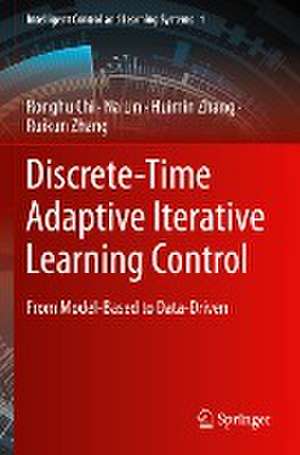Discrete-Time Adaptive Iterative Learning Control: From Model-Based to Data-Driven: Intelligent Control and Learning Systems, cartea 1
Autor Ronghu Chi, Na Lin, Huimin Zhang, Ruikun Zhangen Limba Engleză Paperback – 23 mar 2023
| Toate formatele și edițiile | Preț | Express |
|---|---|---|
| Paperback (1) | 777.50 lei 6-8 săpt. | |
| Springer Nature Singapore – 23 mar 2023 | 777.50 lei 6-8 săpt. | |
| Hardback (1) | 783.50 lei 6-8 săpt. | |
| Springer Nature Singapore – 22 mar 2022 | 783.50 lei 6-8 săpt. |
Preț: 777.50 lei
Preț vechi: 948.18 lei
-18% Nou
Puncte Express: 1166
Preț estimativ în valută:
148.77€ • 155.34$ • 122.85£
148.77€ • 155.34$ • 122.85£
Carte tipărită la comandă
Livrare economică 15-29 aprilie
Preluare comenzi: 021 569.72.76
Specificații
ISBN-13: 9789811904660
ISBN-10: 9811904669
Pagini: 206
Ilustrații: X, 206 p. 83 illus., 72 illus. in color.
Dimensiuni: 155 x 235 mm
Greutate: 0.31 kg
Ediția:1st ed. 2022
Editura: Springer Nature Singapore
Colecția Springer
Seria Intelligent Control and Learning Systems
Locul publicării:Singapore, Singapore
ISBN-10: 9811904669
Pagini: 206
Ilustrații: X, 206 p. 83 illus., 72 illus. in color.
Dimensiuni: 155 x 235 mm
Greutate: 0.31 kg
Ediția:1st ed. 2022
Editura: Springer Nature Singapore
Colecția Springer
Seria Intelligent Control and Learning Systems
Locul publicării:Singapore, Singapore
Cuprins
Chapter 1: Introduction.- Part 1: Model-based Discrete-time Adaptive ILC.- Chapter 2: Discrete-time Adaptive ILC for Linear Parametric Systems.- Chapter 3: Discrete-time Adaptive ILC for Higher order Parametric Systems.- Chapter 4: Data-weighted Discrete-time Adaptive ILC Chapter.- 5: Discrete-time Adaptive ILC for Nonparametric Nonlinear Systems Part 2: Data-driven Discrete-time Adaptive ILC Chapter.- 6: Neural Network based Discrete-time Adaptive ILC.- Chapter 7: Data-driven Discrete-time Adaptive ILC for Nonaffined Nonlinear Systems.- Chapter 8: Multi-input Enhanced Data-driven Discrete-time Adaptive ILC.- Chapter 9: High-order Internal Model based Data-driven Terminal Adaptive ILC.- Chapter 10: Conclusions Appendices
Recenzii
“This book should be viewed as a (relatively) small handbook of discrete-time adaptive iterative learning control (DAILC) in its (very) contemporary version. … The book can serve both as a handbook but also a textbook for graduate and postgraduate researchers.” (Vladimir Răsvan, zbMATH 1491.93002, 2022)
Notă biografică
Ronghu Chi received the Ph.D. degree from Beijing Jiaotong University, Beijing China, in 2007. He was Visiting Scholar with Nanyang Technological University, Singapore, from 2011 to 2012 and Visiting Professor with University of Alberta, Edmonton, AB, Canada, from 2014 to 2015. In 2007, he joined Qingdao University of Science and Technology, Qingdao, China, and is currently a full professor in the School of Automation and Electronic Engineering. He served as various positions in international conferences and was an invited guest editor of International Journal of Automation and Computing. He has also served as a council member of a Shandong Institute of Automation and the deputy director of the technical committee of Data-driven Control, Learning and Optimization Professional Committee, etc. He was awarded the “Taishan scholarship” in 2016. His current research interests include iterative learning control, data-driven control, intelligent transportation systems and so on. He has published over 100 papers in important international journals and conference proceedings.
Na Lin received the M.Sc. degree in automatic control from the Qingdao University of Science and Technology, Qingdao, China, in 2017, where she is currently pursuing the Ph.D. degree in automatic control with the Institute of Artificial Intelligence and Control, School of Automation and Electronic Engineering. Her current research interests include data-driven control and iterative learning control.
Huimin Zhang received the bachelor's degree in electrical engineering and automation from University of Jinan, Jinan, Shandong, China, in 2017. She is currently pursuing the doctoral degree with the Institute of Artificial Intelligence and Control, School of Automation and Electronic Engineering, Qingdao University of Science and Technology, Qingdao, China. Her research interests include data-driven control, iterative learning control, networked system control, and data quantization methods.
Ruikun Zhang received his B.S. and M.S. degrees in applied mathematics from Qingdao University, Qingdao, China, in 2003 and Zhejiang University, Hangzhou, China, in 2006, respectively. In 2006, he joined Qingdao University of Science and Technology and is currently an associate professor in the school of mathematics and physics. In 2016, he received the Ph.D. degree from Beijing Jiaotong University, Beijing China. His research interests include iterative learning control, robust control, and adaptive control.
Textul de pe ultima copertă
This book belongs to the subject of control and systems theory. The discrete-time adaptive iterative learning control (DAILC) is discussed as a cutting-edge of ILC and can address random initial states, iteration-varying targets, and other non-repetitive uncertainties in practical applications. This book begins with the design and analysis of model-based DAILC methods by referencing the tools used in the discrete-time adaptive control theory. To overcome the extreme difficulties in modeling a complex system, the data-driven DAILC methods are further discussed by building a linear parametric data mapping between two consecutive iterations. Other significant improvements and extensions of the model-based/data-driven DAILC are also studied to facilitate broader applications. The readers can learn the recent progress on DAILC with consideration of various applications. This book is intended for academic scholars, engineers and graduate students who are interested in learning control, adaptive control, nonlinear systems, and related fields.
Caracteristici
Focuses on discrete-time adaptive iterative learning control (DAILC) Proposes systematic procedures for design and analysis of model-based DAILC for parametric systems Proposes systematic procedures for design and analysis of adaptive terminal ILC for nonlinear systems










